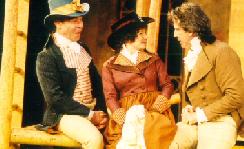SEARCH CurtainUp
On TKTS
LETTERS TO EDITOR
REVIEWS
FEATURES
ADDRESS BOOKS
Broadway
Off-Broadway
DC
NEWS (Etcetera)
BOOKS and CDs
OTHER PLACES
Berkshires
DC (Washington)
London
Los Angeles
QUOTES
FILM
LINKS
MISCELLANEOUS
Free Updates
Masthead
Type too small?
NYC Weather
 London Review
London Review
Love's Labour's Lost
by Lizzie Loveridge
First Call Ticketing
|
A lover's eye will gaze an eagle blind. A lover's ear will hear the lowest sound, When the suspicious head of theft is stopped. Love's feeling is more soft and sensible Than are the tender horns of cockled snails. . . --- Berowne |

Paul Kemp, Rebecca Callard, Martin Turner
(Photo: Alistair Muir) |
Love's Labour's Lost
This early Shakespearean play is a complex work for the scholar of Elizabethan language full of obscure puns and verbal references. There is no record of the play being produced at all from 1605 until 1839 and so it may qualify, before the twentieth century, as the least popular of Shakespeare's plays. However modern audiences have warmed to Love's Labour's Lost and various productions have tried to make the wit more comprehensible. There is for me no joke that falls as flat as a pun which has to be explained at length, so this production from the Open Air in Regent's Park comes as a pleasure. Played fast with large sections of the language little more than rhyming or alliterative nonsense, we can appreciate the ideas below the surface of the play, man's pursuit of woman and woman's pursuit of love. Here we can see the seeds of Shakespeare's later plays, the wit of Beatrice and Benedict as the sparring lovers in Much Ado About Nothing and the burlesque Mechanicals' play of A Midsummer Night's Dream.
The plot is a thin device whereby the King (Benedict Cumberbatch) and three young men of the court of Navarre have sworn to devote themselves to learning and contemplation and to deny themselves the company of women. That is before the arrival of the Princess of France (Candid Benson) and her entourage of three pretty women. There is much flirtation, masked confusion and a sudden change of mood in the final scene when the news reaches the Princess of the death of her father, the King of France. The period of mourning means that the four young men, not known for keeping their vows up to now, have to prove themselves constant over a year's separation.
Rachel Kavanaugh's production is fast and lively. The scenes where Holofernes, a schoolmaster (Tim Kightley) are particularly successful with translations given by him for the Latin pontificating in case you do not have a companion, as I did, of an Oxford student of classics! The set is of tall, yellow ladders which end high up in the tops of tall shrubs and serve as bookshelves below, making perfect hiding places for people to overhear what is being said about them whilst their clothes blend with the yellow walls. These are either outside or inside the castle's boundaries according to the way the guarding stags aloft the gateposts are pointing. The production is prettily dressed, in early eighteenth century Empire mode. I liked the ball scene when the women are masked in their finery and the man arrive as Cossacks, disguised with large black beards, Russian tunics, ballooning trousers, boots and hats of Persian lamb. In the entertainment play from the amateur actors, Don Adriano de Armado (Christopher Godwin) as Hector wears platform shoes which rival anything Elton John wore in the 1970s.
Of the performances, besides that of Tim Kightley, stands out Adrian Schiller as Berowne, who has many of the more comprehensible lines of elegant wit and repartee with Rosaline (Rebecca Johnson). I liked too Martin Turner's French courtier, Boyet, loud and highly amused at the antics of the Spanish men. All in all, Love's Labour's Lost is a pleasant evening in the park's magnificent setting.
|
Love's Labour Lost
Written byby William Shakespeare Directed by Rachel Kavanaugh With: Benedict Cumberbatch, Adrian Schiller, Gideon Turner, Daniel Crowder, Candida Benson, Rebecca Johnson, Rebecca Callard, Lottie Mayor, Martin Turner, David Lucas, Daniel Crossley, Philip York, Christopher Godwin, Richard Frame, Mark Roper, Paul Kemp, Alison Crowther, John Conroy, Timothy Kightley, Howard Ellis. Design: Kit Surrey Composer: Terry Davies Lighting Design: Jason Taylor Sound: Gregory Clarke Movement: Linda Dobell Running time: Two hours 35 minutes with an interval Box Office: 020 7486 2431 Booking to 8th September 2001 Reviewed by Lizzie Loveridge based on the 18th June 2001 performance at the Open Air Theatre, Regent's Park, London NW1 (Nearest Tube station - Baker Street) |






